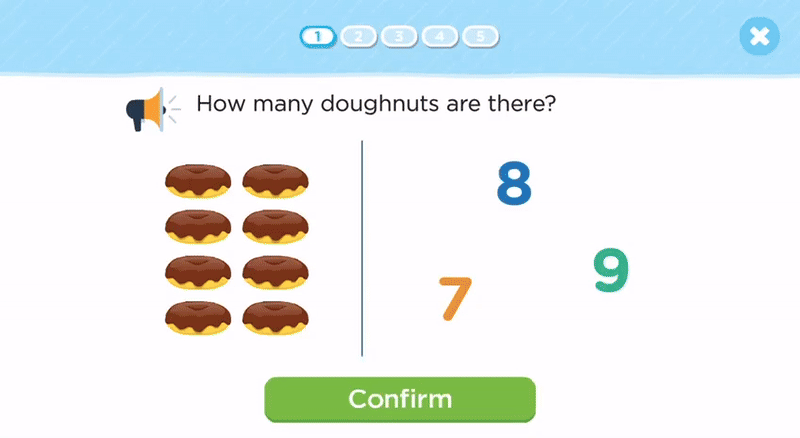Interactive Math Quizzes for Kindergarteners
April 2, 2024
Kindergarten is where it all begins! Up until preschoolers enter the first official grade of their educational career, they merely learn the basics. They learn patterns, how to count, and may begin to compare numbers using pictures. But kindergarten is where kids build a real understanding of number sense and advance to foundational skills such as addition, subtraction, and place value.
In kindergarten, children are faced with a monumental task: to build the very foundation that every other math skill will be built upon. In the space of one school year, 5-year-olds must master a huge number of skills that adults should monitor.
Because the math that 5 and 6-year-olds learn is so crucial to their developing skills, it’s important that parents and teachers have a strong idea of a child’s strengths and weaknesses. The easiest way to get it is to assess their knowledge regularly using a quiz or test. However, it’s understandable that to some quizzing a 6-year-old might seem boring and unmotivating. That’s where Kids Academy comes in to save the day! We provide short, targeted interactive math quizzes for kindergarten that feel more like solving a puzzle than completing a math problem. By playing with gamified quizzes, kids have fun while working hard, and teachers and parents get the feedback they need to monitor learning.
Quizzes Created with Kindergarteners in Mind
In kindergarten, children are faced with a monumental task: to build the very foundation that every other math skill will be built upon. In the space of one school year, 5-year-olds must master a huge number of skills that adults should monitor. Some of the most important concepts that educators and parents should check for include:
1. Counting objects in a group: Before learning to add and subtract, kids must develop number sense to understand that objects can be counted in any order, but numbers have an order. By recognizing a group of objects and being able to determine the number simply by looking at it, learners begin to understand what happens if you add more objects to the group or take them away. Also known as grouping, this concept illustrates that a collection of items represents one number.
To check for understanding, a quiz like this one presents students with a challenge illustrated by vivid images of relatable objects. Because most 5-year-olds are often unable to read, the instructions are read aloud and can be replayed by pressing the speaker phone. Each interactive quiz from Kids Academy is meant to feel more like solving a puzzle which makes it more enjoyable and less overwhelming. Children get instant feedback, and adults gain insight into their learning.
2. Addition and Subtraction: Once they grasp that numbers have an order, kindergartners go on to learn addition and subtraction. This quiz provides visuals of base blocks that support their number sense as they learn to recognize equations and what they represent. Eventually, children will no longer need visuals, but will naturally understand that numbers represent groups of items. Because this can be a tricky concept, each task in the quiz only presents a single problem to keep students focused.
In the subtraction quiz below, the slashes visually represent how many aliens are taken away to illustrate the equation. By completing this, parents and teachers get a good idea of whether students understand the concept of subtraction or if they need to take a step back and review earlier skills.
3. Comparing objects by size, including weight, length, and height: There are a variety of measurable attributes, and kindergarteners learn to compare objects in a myriad of different ways. Our quizzes are the best way to assess knowledge of specific measurable attributes because each focuses on only one concept at a time.
Each of the photos above show two separate quizzes. The first focuses on length only, while the second focuses on weight. By breaking concepts down into individual measurable attributes, the giant math skill that is measurement is less overwhelming while giving adults a very clear picture of what kids do or do not understand.
4. Shapes, including 2D and 3D: 6-year-olds learn to discriminate between different sizes and types of shapes. Since early geometry skills also include a lot of different concepts, each quiz is broken down, just like the measurement quizzes. The quiz below targets 2D versus 3D shapes, while other quizzes focus on different sizes of shapes, and more.
As mentioned earlier, all quizzes are gamified by including interactive elements that make completion feel like a game instead of a test. Equipped with cheerful images, instructions, and positive feedback, learners are engaged and motivated. Best of all, parents and teachers can easily tell which skills need more work from those that are mastered. Overall, quizzes are a powerful tool to assess learning in a fun and encouraging way.
In addition to math quizzes for kindergarteners, we are proud to provide you with a whole library of worksheets, videos, learning games, and quizzes that span the entire curriculum for kids in preschool through third grade. Find everything you need to support your child’s learning, including supplementary materials like coloring sheets and chess lessons!
On our website, you'll find more resources from Kids Academy, such as an entire collection of math worksheets for kindergarteners, to support your little learners with the highest quality resources available!
















